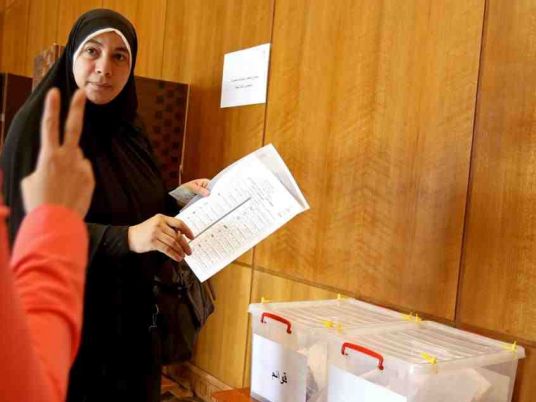
Egyptians residing abroad began casting votes Saturday in the country's first parliamentary election since the 2013 military overthrow of Islamist President Mohammed Morsi.
Egypt's state-run news wire MENA said embassies and consulates in 139 countries will be open for two days of voting.
The vote is staggered, with polling in half of Egypt's governorates set to start Sunday. The election will take place in two phases, concluding in early December.
President Abdel Fattah al-Sisi called on Egyptians to vote in a televised speech Saturday.
"Line up in front of polling stations and plant with your votes the hope for a bright tomorrow for our new Egypt," he said.
Voting will go forward in Egypt under heavy security, in light of regular militant attacks since Morsi's ouster. At least 185,000 military troops will secure the election in the first phase, MENA reported. Interior Ministry spokesman Abu Bakr Abdel-Karim said they will be joined by 180,000 police.
Few candidates have broad recognition or clear platforms, and most have a pro-government bent.
"There are no big issues being discussed because that's not the nature of it … it's not an election of ideas," said Khaled Dawoud, a prominent member of the center-left Dostour party. "They are competing over who will be the new president's men."
Political parties are heavily disadvantaged by an election law, passed by presidential decree last year. Seventy-five percent of the assembly is reserved for candidates running as individuals, races in which prominent, wealthy government-affiliated power brokers have a presumed advantage.
The government's supporters reject the criticism from opposition political parties, insisting the field is wide open for anyone who wants to compete.
The vote will mark the final step in what has been billed as a transition to democracy. But critics say the next legislature is likely to be a rubber-stamp body that further solidifies the power of el-Sissi, a former general who led Morsi's overthrow.
The vote is also taking place in an atmosphere in which public criticism of the government is strongly discouraged. Virtually the entire media is supportive of al-Sisi and regularly berate critics as traitors or supporters of Morsi's Muslim Brotherhood, which is now officially branded a terrorist group.
Egypt has been without a parliament since it was dissolved by a court ruling in 2012.
The 2011 election, held after the uprising that toppled longtime autocrat Hosni Mubarak, saw candidates from across the political spectrum, from ultra-conservative Islamists to left-wing youths, vying for seats. Egyptians stood in line for hours to cast their votes — many for the first time in their lives — and the Muslim Brotherhood won the largest bloc.
None of the key liberal figures that helped fuel the 2011 uprising, like Nobel Peace laureate Mohamed ElBaradei or former presidential candidate Hamdeen Sabahi, are running in the current elections.
In the face of the government's crackdown and curbed freedoms, lesser known pro-democracy activists who burst onto the political scene in 2011 have either sought exile abroad, withdrawn from public politics or been jailed.
Democracy International, an organization that monitors elections, said Friday it would not be able to "conduct the comprehensive observation mission earlier envisioned" because Egypt had failed to issue visas to some members of its team. The organization monitored the constitutional referendum and presidential election last year.
